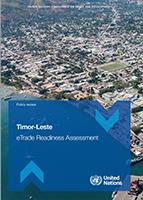
The eTrade Readiness Assessment of Timor-Leste is the thirty-eighth assessment conducted by UNCTAD and the eleventh in the Pacific region. The assessment aims to explore how e-commerce can serve as a driver of economic growth by providing a comprehensive review of the e-commerce ecosystem. It outlines the key challenges that must be addressed through cohesive policy implementation, capacity building, and strategic partnerships.
- E-commerce is emerging as a strategic priority for Timor-Leste as the country seeks closer integration with ASEAN. Regulatory harmonisation and support for digital trade are essential to advancing its membership ambitions. Government initiatives such as Timor Digital 2032 and the forthcoming National E-commerce Strategy, supported by UNCTAD, reflect a strong commitment to digital transformation and economic diversification.
- Internet speed and affordability remain key barriers to e-commerce and digital growth in Timor-Leste, despite 96% 3G and 45% 4G coverage. Only 41% of the population used the Internet in late 2022, well below the regional average, with online shopping still limited. The forthcoming Timor-Leste South Submarine Cable (TLSSC) and planned Internet exchange point (IXP) mark a turning point for Timor-Leste’s digital infrastructure, but their success hinges on more than just improved bandwidth.While these advancements will lower latency, improve internet speeds, and reduce costs, their full benefits will only materialize with parallel investments in last-mile connectivity, local hosting services, and digital literacy. Faster and more affordable internet enables more opportunities for local businesses, creatives, and developers to produce and share Timorese content. This could stimulate local entrepreneurship, e-commerce, and cultural expression online. Language barriers—such as limited Tetum content and weak English proficiency—also constrain digital uptake. While digital entrepreneurship is still emerging, support from development partners and local IT firms is beginning to build momentum.
- Timor-Leste is investing in national transportation infrastructure while advancing trade digitalisation through the adoption of ASYCUDA World and the development of the Timor-Leste Electronic Single Window (TileSW), which links Customs with regulatory agencies to streamline trade processes.
- Digital financial services are expanding, with access points up 32% and digital wallet use rising, driven by TPay and Mosan. Financial inclusion has improved with 64% of adults having an account with a formal institution, with Dili leading at 94% bank account penetration. Digital wallets, reaching 82% of provinces, are outpacing traditional banking in access and are key to e-commerce growth. Yet, cash remains dominant, especially in rural areas, and only 14% of Timorese engage in online shopping. Low digital literacy, limited trust, and low wallet usage for everyday purchases remain key barriers to broader e-commerce uptake.
- Timor-Leste is progressing toward a stronger e-commerce legal framework but faces key challenges, including limited institutional capacity and outdated laws. A key milestone was the enactment of Decree-Law 12/2024, which aligns with UNCITRAL Model Laws and formally recognizes electronic transactions, signatures, and documents. Other legal developments include the 2016 Consumer Protection Law, a draft cybercrime bill, and a draft data protection law. Efforts are also under way to modernise the Intellectual Property (IP)framework, establish an IP office. The country is also exploring mutual agreements for electronic data exchange with other countries to enhance digital trade integration, starting with Indonesia.
- Timor-Leste’s banking system offers limited lending, with five commercial banks—four international and one national (BNCTL)—struggling to expand credit. Other deposit-taking institutions (ODTIs) are more active in the credit market. SMEs, including digital entrepreneurs, face barriers such as an incomplete land registry, lack of a movable collateral registry, and limited alternative financing options. The Credit Guarantee Scheme has seen low uptake. Development partners, including the YEES programme, are helping to bridge gaps through start-up competitions and loan guarantees to support entrepreneurship and digital growth.
The policy recommendations outlined in Timor-Leste’s eTrade Readiness Assessment aim to support and strengthen the Government’s ongoing efforts to advance the country’s digital transformation. They focus on enhancing digital capabilities, fostering economic growth, and facilitating Timor-Leste’s integration into the regional and global digital landscape. These recommendations also lay the foundation for the development of a National E-commerce Strategy.
This assessment was made possible through the financial support of the European Union through the Pacific Digital Economy Programme.


